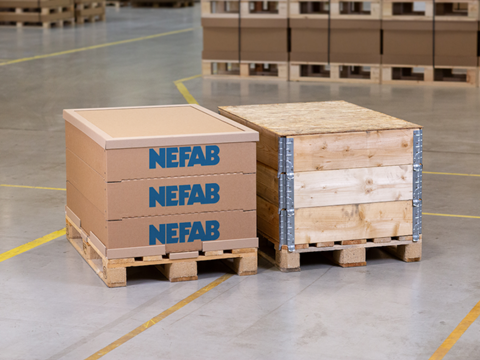
Nefab has introduced the latest version of its EdgePak Collar, a fibre-based alternative to wooden pallet collars designed for one-way shipments, seeking to provide a ‘practical and cost-effective’ solution for industries where return logistics are not feasible.
According to Nefab’s Life Cycle Analysis, replacing wooden pallet collars with EdgePak Collar in one-way flows can result in 34% lower CO2-eq emissions due to lightweight, “low-carbon” materials, and 49% less landfill waste as it is recyclable in the paper stream. It is also said to achieve 40% less weight than wooden solutions, reducing air freight by up to 16%, and have “seamless integration”, quick assembly and standard sizes, ensuring compatibility with existing processes.
Nefab adds that the EdgePak Collar line’s full-pallet-sized options maintain the strength and stability required for demanding supply chains with greater adaptability for diverse shipping needs. The larger sizes are available in EUR (1200x800mm), US (48″ x 40″), and the original ½ EUR (800x600mm) for different logistics requirements. The reinforced corrugated collar design apparently provides better stiffness, enhancing stability for better product protection during handling and stacking.
In similar news, e-commerce packaging supplier UCanPack recently announced its 100% recycled corrugated shipping box line said to be “customizable, durable, and affordable”. The boxes are available in over 1,000 sizes and designed for efficient logistics, aiming to reduce emissions through flat-packed designs.
Last month Hey Circle revealed that the robustness and durability of its reusable shipping packaging has been tested in conveyor belt, stack pressure and drop tests with the Gebhardt Intralogistics Group and the Leipzig University of Applied Sciences (HTWK). According to Hey Circle, the boxes survived drop tests from a height of 80 cm including loads of up to 20kg.
If you liked this story, you might also enjoy:
The ultimate guide to the Packaging and Packaging Waste Regulation in 2025
How are the top brands progressing on packaging sustainability?
Everything you need to know about global packaging sustainability regulation in 2025
The key to increasing the use of reusable packaging in supermarkets














No comments yet